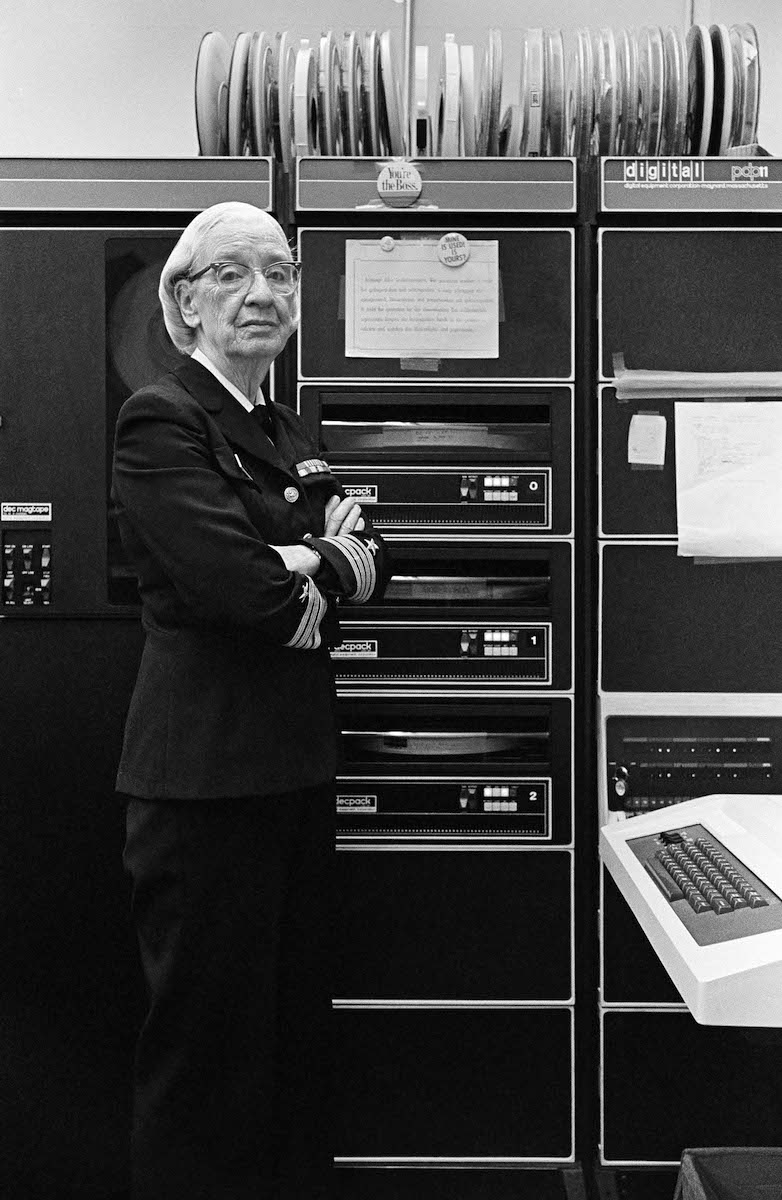Hopper, Grace Murray
Enlarge text Shrink text- Billings, C.W. Grace Hopper : Navy admiral and computer pioneer, c1989:p. 13 (Grace Brewster Murray; b. 12/9/06)
- Data from ALA Booklist for The Captain is a lady [MP](Grace Murray Hopper; U.S. Navy captain; pioneer in develop. of computers)
- Schneider, C.J. Grace Murray Hopper, c1998:p. 55 (d. in 1992)
- Beyer, Kurt W. Grace Hopper and the invention of the information age, 2009:t.p. (Grace Hopper) pref. (b. 1906; d. 1992)
Grace Brewster Hopper (née Murray; December 9, 1906 – January 1, 1992) was an American computer scientist, mathematician, and United States Navy rear admiral. She was a pioneer of computer programming. Hopper was the first to devise the theory of machine-independent programming languages, and used this theory to develop the FLOW-MATIC programming language and COBOL, an early high-level programming language still in use today. She was also one of the first programmers on the Harvard Mark I computer. She is credited with writing the first computer manual, "A Manual of Operation for the Automatic Sequence Controlled Calculator." Before joining the Navy, Hopper earned a Ph.D. in both mathematics and mathematical physics from Yale University and was a professor of mathematics at Vassar College. She left her position at Vassar to join the United States Navy Reserve during World War II. Hopper began her computing career in 1944 as a member of the Harvard Mark I team, led by Howard H. Aiken. In 1949, she joined the Eckert–Mauchly Computer Corporation and was part of the team that developed the UNIVAC I computer. At Eckert–Mauchly she managed the development of one of the first COBOL compilers. She believed that programming should be simplified with an English-based computer programming language. Her compiler converted English terms into machine code understood by computers. By 1952, Hopper had finished her program linker (originally called a compiler), which was written for the A-0 System. In 1954, Eckert–Mauchly chose Hopper to lead their department for automatic programming, and she led the release of some of the first compiled languages like FLOW-MATIC. In 1959, she participated in the CODASYL consortium, helping to create a machine-independent programming language called COBOL language, which was based on English words. Hopper promoted the use of the language throughout the 60s. The U.S. Navy Arleigh Burke-class guided-missile destroyer USS Hopper was named for her, as was the Cray XE6 "Hopper" supercomputer at NERSC, and the Nvidia GPU architecture "Hopper". During her lifetime, Hopper was awarded 40 honorary degrees from universities across the world. A college at Yale University was renamed in her honor. In 1991, she received the National Medal of Technology. On November 22, 2016, she was posthumously awarded the Presidential Medal of Freedom by President Barack Obama. In 2024, the Institute of Electrical and Electronics Engineers (IEEE) dedicated a marker in honor of Grace Hopper at the University of Pennsylvania for her role in inventing the A-0 compiler during her time as a Lecturer in the School of Engineering, citing her inspirational impact on young engineers.
Read more on Wikipedia >
 Personality
Personality


.jpg)





